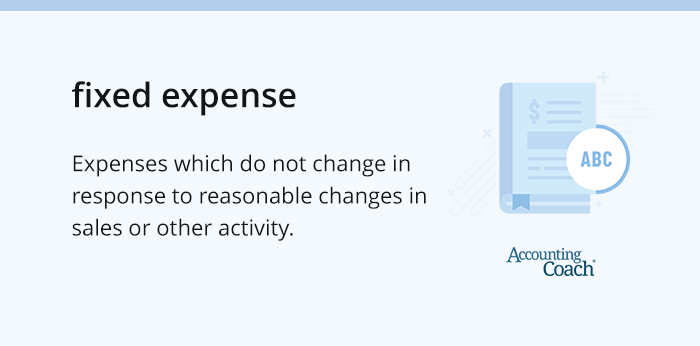Definition of Fixed Expense
A fixed expense is an expense whose total amount does not change when there is an increase in an activity such as sales or production. The words within a relevant or reasonable range of activity are normally added to the definition because at an extremely high volume or low volume, a change will likely occur.
Examples of Fixed Expenses
Let’s assume that a retailer’s monthly rent is $2,000. If the rent will remain at $2,000 whether the monthly sales are $15,000 or $30,000, we will say that the rent is a fixed expense. (Of course, if sales triple or drop to be 20% of the normal amount, the rent will likely have to change. Nonetheless, the present rent of $2,000 is considered to be a fixed expense since the extreme conditions are outside of the relevant range for short-term analyses.)
Other examples of expenses that are likely to be fixed within a reasonable range of retail sales include:
- The store manager’s annual salary
- The depreciation expense for the buildings, fixtures, and equipment
- The fixed contracts for security, maintenance fees, phones, internet service, insurance, lighting, advertising, etc.
Knowing the amount of a company’s fixed expenses assists in understanding how the retailer’s net income will change as volume changes. The total amount of fixed expenses can also be used to quickly estimate a company’s break-even point.
FAQ
What is a fixed cost?
A fixed cost is one that does not change in total within a reasonable range of activity.
Learn more about fixed costs
What is a variable expense?
An expense is variable when its total amount changes in proportion to the change in sales, production, or some other activity.
Learn more about variable expenses
What is a variable cost?
A variable cost is a constant amount per unit produced or used. Therefore, the total amount of the variable cost will change proportionately with the change in volume or activity.
Learn more about variable costs





